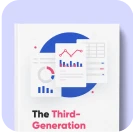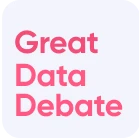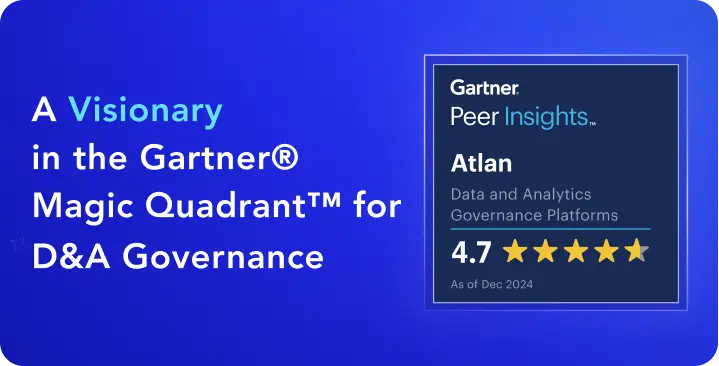Business Glossary & GDPR: A Smarter Way to Compliance
Share this article
A business glossary can help in understanding and managing data and data-related terms and definitions, which are crucial aspects of GDPR compliance.
The General Data Protection Regulation (GDPR) is a pivotal data protection law passed by the European Union to protect the privacy of its citizens by ensuring that organizations handle personal data responsibly. For businesses to be compliant with GDPR, they need a coherent way of defining and communicating data-related terms and definitions. This is where a business glossary comes into play.
So, in this article, we will explore:
- How business glossaries can help in GDPR compliance
- Practical examples of how you could use a business glossary for GDPR compliance, and
- The avoidable consequences of not using them
Let’s dive in!
Table of contents #
- 10 Ways a business glossary helps in GDPR compliance
- How to use a business glossary for GDPR: 6 Practical examples
- 7 Consequences of not using a business glossary for GDPR compliance
- Summary
- Related reads
10 Ways a business glossary helps in GDPR compliance #
A business glossary is a central repository of business terms, definitions, and associated metadata. It helps in standardizing definitions, ensuring data consistency, and enhancing data governance.
In this section, we will explore how a business glossary can assist organizations in GDPR compliance:
- Clarifies data-related terminology
- Centralizes definitions for personal data
- Enhances data lineage visualization
- Assists in data inventory and mapping
- Supports data protection impact assessments
- Improves training and awareness programs
- Aids in identifying data processing activities
- Enables consistent data reporting
- Supports data subject rights fulfillment
- Facilitates communication with data protection officers
Let us look at each of the above points in brief:
1. Clarifies data-related terminology #
For GDPR compliance, it’s imperative that everyone in the organization understands data-related terms consistently. A business glossary provides clear definitions, ensuring everyone is on the same page and eliminating ambiguity.
2. Centralizes definitions for personal data #
The GDPR requires organizations to protect “personal data.” A glossary centralizes what constitutes personal data, from names and addresses to IP addresses and biometric data, ensuring no critical type of data is overlooked.
3. Enhances data lineage visualization #
Understanding where data originates, how it’s processed, and where it moves is key to GDPR. A glossary can be integrated with data lineage tools to offer a visual representation, making it easier to track and manage data.
4. Assists in data inventory and mapping #
Under GDPR, organizations need to know what data they have, where it’s stored, and how it’s used. A business glossary helps categorize data, aiding in the creation of a comprehensive data inventory and map.
5. Supports data protection impact assessments #
When introducing new data processing methods or tools, GDPR demands Data Protection Impact Assessments (DPIA). A glossary helps in understanding data elements, potential risks, and required controls.
6. Improves training and awareness programs #
To maintain GDPR compliance, continuous staff training is vital. A glossary serves as a reliable reference during training sessions, ensuring consistent communication about data-related topics.
7. Aids in identifying data processing activities #
GDPR mandates that organizations maintain a record of their data processing activities. With a glossary in place, it’s easier to categorize and document these activities comprehensively.
8. Enables consistent data reporting #
Organizations need to report breaches, data processing activities, and more under GDPR. A business glossary ensures data-related terms in reports are consistently defined, making reporting accurate and comprehensible.
9. Supports data subject rights fulfillment #
GDPR grants data subjects certain rights, like the right to data portability or erasure. A glossary can help teams understand these rights and the associated data, streamlining request fulfillment.
10. Facilitates communication with data protection officers #
Every major organization dealing with EU citizens’ data should have a Data Protection Officer (DPO). A business glossary ensures that the DPO, IT teams, and other stakeholders communicate using consistent terminology, making GDPR-related discussions more productive.
A business glossary is not just a tool for standardizing terminology but a strategic asset in the GDPR compliance journey. By ensuring clarity, facilitating communication, and aiding in data management, it serves as a foundation for robust data governance in line with GDPR mandates.
How to use a business glossary for GDPR: 6 Practical examples #
In this section, we will examine six practical ways you could use a business glossary to comply with GDPR norms. They are:
- Streamlining data subject access requests (DSARs)
- Clarifying contract terms in B2B partnerships
- Enhancing impact assessments with precise data definitions
- Enabling better vendor management in B2B contexts
- Standardizing employee onboarding processes
- Ensuring consistent customer communication and marketing practices
Now, let us look at each of the above examples in detail:
1. Streamlining data subject access requests (DSARs) #
- Situation: A European customer requests to see all personal data the company holds about them.
- Role of the business glossary: By having clear definitions for terms like “personal data,” “processing activities,” and “data storage,” the company can quickly gather and provide the exact information required, ensuring GDPR compliance and prompt customer response.
2. Clarifying contract terms in B2B partnerships #
- Situation: Two companies are entering a partnership, and one will have access to the other’s customer data.
- Role of the business glossary: The business glossary can offer precise definitions for terms like “data processor,” “data controller,” and “data protection officer.” By incorporating these definitions into contracts, both parties ensure a shared understanding of responsibilities and expectations related to data handling under GDPR.
3. Enhancing impact assessments with precise data definitions #
- Situation: An organization is launching a new product and needs to conduct a Data Protection Impact Assessment (DPIA) to gauge potential privacy risks.
- Role of the business glossary: By referring to the glossary’s definitions of “data categories,” “data sources,” and “risk levels,” the assessment team can ensure a thorough and consistent evaluation, effectively identifying any GDPR-related risks.
4. Enabling better vendor management in B2B contexts #
- Situation: A company is sourcing a third-party vendor to manage its cloud storage solutions and wants to ensure GDPR compliance.
- Role of the business glossary: The glossary can provide clear definitions for “data transfer,” “encryption,” and “breach notification.” With these definitions, the company can articulate its requirements to the vendor with clarity, ensuring both parties are aligned in terms of GDPR compliance expectations.
5. Standardizing employee onboarding processes #
- Situation: A multinational company is hiring new employees across several EU countries.
- Role of the business glossary: By providing standard definitions for “employee data,” “consent,” and “data retention,” the HR team can ensure a consistent onboarding process across different locations. This consistency ensures that employee data is always handled in compliance with GDPR, regardless of regional differences.
6. Ensuring consistent customer communication and marketing practices #
- Situation: A company plans to launch a new marketing campaign targeting its European customers.
- Role of the business glossary: By referencing terms like “opt-in,” “personalized advertising,” and “data anonymization” from the glossary, the marketing team can tailor their campaign to respect GDPR requirements, ensuring that communications are both effective and compliant.
A business glossary is more than just a compilation of terms—it’s a practical tool that can guide various facets of an organization in its GDPR compliance journey. By providing clarity and standardization, it ensures that whether in B2B collaborations or customer interactions, data protection remains front and center.
7 Consequences of not using a business glossary for GDPR compliance #
While a business glossary is not a mandatory tool, its absence can lead to ambiguities and misinterpretations, potentially resulting in GDPR non-compliance. In this section, we will explore the potential consequences businesses might face when not leveraging a business glossary for GDPR compliance, which are:
- Increased risk of data breaches
- Misalignment in organizational understanding
- Compromised data subject rights
- Difficulties in data mapping
- Inefficient or inaccurate data impact assessments
- Potential legal and contractual disputes
- Erosion of customer trust and brand reputation
Now, let us look at each of the above consequences in brief:
1. Increased risk of data breaches #
Without a unified understanding of key data terminologies via a business glossary, businesses may fail to implement adequate protection measures for certain data categories. Misunderstandings can lead to lapses in data security, rendering the organization vulnerable to breaches.
2. Misalignment in organizational understanding #
A business glossary ensures that all departments and teams within a business have a shared understanding of data-related terms. In its absence, different teams might interpret terms differently, leading to inconsistent data handling practices, which can inadvertently cause GDPR violations.
3. Compromised data subject rights #
GDPR grants individuals various rights concerning their personal data. Without clear definitions of what constitutes “personal data,” “data processing,” or “consent,” businesses might fail to adequately respond to data subjects’ requests, infringing on their rights.
4. Difficulties in data mapping #
A clear understanding of data-related terminologies aids in tracing the flow of data throughout the organization. Without this clarity using a business glossary, businesses might struggle to track data lineage, making it challenging to identify, manage, and protect personal data in line with GDPR requirements.
5. Inefficient or inaccurate data impact assessments #
Data Protection Impact Assessments (DPIAs) rely on a clear understanding of data categories, sources, and processing activities. Without a business glossary to refer to, these assessments might miss potential risks or misjudge the impact of certain data processing actions, leading to non-compliant practices.
6. Potential legal and contractual disputes #
In B2B contexts, contracts often reference specific data-related terms. Ambiguities or misinterpretations arising from a lack of a unified glossary can lead to disputes or disagreements, potentially resulting in legal battles or breaches of contracts.
7. Erosion of customer trust and brand reputation #
GDPR emphasizes transparency and the protection of individual rights. If a company fails to adhere to GDPR requirements due to misinterpretations stemming from a lack of a business glossary, it could face public backlash. Breaches, infringements, or perceived negligence can damage the company’s reputation and erode customer trust.
While a business glossary might seem like a supplementary tool, its role in fostering clarity and consistency is paramount, especially in the context of GDPR. Not employing such a glossary can have cascading consequences, from operational inefficiencies to significant reputational and financial damages. It’s in the best interest of businesses to recognize and mitigate these risks early on.
Summary #
A business glossary offers clear definitions of data elements, ensuring consistent interpretation and facilitating data mapping, which is crucial for GDPR. Using a business glossary aids in GDPR practices like handling data subject access requests and ensuring data protection in B2B partnerships.
However, neglecting such a tool can lead to risks like data breaches, misalignment in data understanding, compromised individual rights, and even potential legal disputes. Effective use of a business glossary not only ensures compliance but also reinforces trust and maintains organizational reputation in the data-driven landscape.
Business glossary & GDPR: Related reads #
- Business Glossary: The Key to Data Discovery and Governance
- Business Glossary — Definition, Examples, Responsibility & 5 Common Challenges
- What is a Business Glossary Template? & How to Build a Business Glossary for Your Organization?
- Data Dictionary vs. Business Glossary: Definitions, Examples & Why Do They Matter?
Share this article











